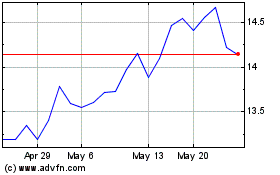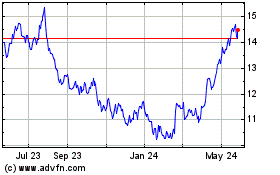Asian Shares Mixed After Oil-Output Cuts
December 11 2016 - 11:20PM
Dow Jones News
Asian share markets opened higher Monday, as oil surged after
major producers struck a deal to cut output along with the
Organization of the Petroleum Exporting Countries.
In Japan, a weak yen helped to lift stocks.
But markets pared earlier gains on heavy profit-taking pressure,
with China leading declines as the government initiated a crackdown
on stock-acquiring insurers. The Shanghai Composite Index was
recently down 0.8%, while Hong Kong's Hang Seng Index was off
0.5%.
Elsewhere, the Nikkei Stock Average rose 0.7%, aided by a 0.2%
gain in the U.S. dollar against the yen, though the index was
earlier up more than 1%. Australia's S&P/ASX 200 was up 0.1%,
trimming earlier gains despite a rise in energy stocks, while South
Korea's Kospi was down 0.1%.
Over the weekend, non-OPEC oil producers agreed to remove
558,000 barrels a day of crude from the market. That would come on
top of 1.2 million barrels a day in cuts already agreed to by OPEC,
amounting to a total of almost 2% of global oil supply.
The non-OPEC cuts, if carried out as described over the first
half of 2017, would represent an unprecedented level of cooperation
among oil-producing countries that have been seeking ways to lift
oil prices out of two years in the doldrums.
"The latest step shows that the OPEC has overcome that hurdle,"
said Vivek Dhar, commodities strategist at Commonwealth Bank of
Australia, who cautioned that going forward, compliance by agreed
parties will be the key indicator to watch.
Oil-related shares across the region gained, while prices for
the international crude-oil benchmark, Brent, surged 4.2% in Asian
trade to $56.64 a barrel.
In Australia, Oil Search gained 3.3%, Woodside Petroleum was
higher by 2.9% with Santos trading 4.3% higher. Japan Petroleum was
also higher by 4.8%, while in Hong Kong, shares of offshore Chinese
oil producer Cnooc gained 1.0%.
Shares of Chinese insurers were among the big decliners in the
A-shares market on Monday, with China Life Insurance and New China
Life Insurance trading down 0.8% each.
The China Insurance Regulatory Commission late Friday banned
insurer Evergrande Life from investing further in stocks, saying it
had been conducting short-term trading on the stock market. The ban
comes two days after the CIRC said it would inspect Evergrande and
another insurer for compliance. The recent stock-investment spree
by some insurers have helped boost trading activity in the Chinese
markets.
Meanwhile, the U.S. dollar gained on Monday as a near-certain
interest-rate increase by the Federal Reserve was set for later
this week when the Federal Open Market Committee meets. The WSJ
Dollar Index, which measures the U.S. currency against 16 others,
rose a further 0.1% in Asian trade, after it rose 0.5% in the U.S.
on Friday.
However, some analysts cautioned that the market may not be
prepared for any hawkish commentary from the Fed this week that
could affect investor trading sentiment.
"It is only a matter of time before the Fed gets hawkish because
of inflation," said Kay Van-Petersen, global macro strategist at
Saxo Capital Markets in Singapore.
U.S. consumer-price gains accelerated in October for the
third-straight month, largely due to rising energy costs. With
rising crude prices, inflation in the country is widely expected to
inch up.
Anjie Zheng and Jenny W. Hsu contributed to this article.
Write to Kenan Machado at kenan.machado@wsj.com
(END) Dow Jones Newswires
December 11, 2016 23:05 ET (04:05 GMT)
Copyright (c) 2016 Dow Jones & Company, Inc.
Hang Seng Bank (PK) (USOTC:HSNGY)
Historical Stock Chart
From Nov 2024 to Dec 2024

Hang Seng Bank (PK) (USOTC:HSNGY)
Historical Stock Chart
From Dec 2023 to Dec 2024
